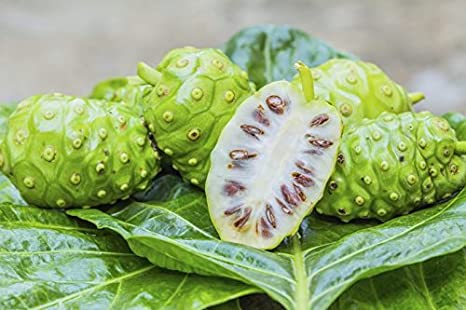"I want to give people inspiration to protect the environment; plant trees, and make it a pleasure to maintain them."
Those are the words of Catholic priest at Damongo Archdiocese in the Savannah region, Father Dr. Clement Aapengnuo, who seeks to supply finest noni fruit trees to Ghanaians.
Noni tree - native to Southeast Asia and Australasia, is a source of phytonutrients, known to boost the immune system as well as repair cellular damage.
They have anti-inflammatory, anti-viral, and anti-bacterial compounds.
Fr. Aapengnuo says the tree is a potential income generator that can give cultivators in rural areas, at least, 300 cedis in a month.
"If you have three of the trees and every month you fill ten bottles at 10 cedis that's 300 cedis. That is basic salary for some people," he says.
In just a few years of planting the tree, he says it is only appropriate to share what is good with Ghanaians.
The Noni tree, known scientifically as Morinda citrifolia grows in shady forests, as well as on open rocky or sandy shores of rivers.
It matures in about 18 months, and begins to bear between 4 and 8 kg of fruits every month.
"The amazing thing about this tree, it fruits all year round even in the dry season. So pluck and pluck the fruits."
The oval-shaped of 10-18 centimeters in size, is also known as cheese fruit or even vomit fruit, due to its pungent smell when ripening.
"Just on the same branch, you would have some flowering while others are fruiting. So there is a constant supply."
The tree is tolerant of saline soils, drought conditions, and secondary soils.
It can grow up to 9m tall, with large, simple, dark green, shiny and deeply veined leaves.
Besides its ability to beautify the environment and provide oxygen, a variety of products from the fruit can be found on the consumer market.
"Now we have got an outlet. When you do you package it nicely and put it in a small bottle."
They come in the form of beverage, powder and other cosmetics as well as oil.
But in Damongo people know it in bevergare.
"I was surprised to see that a lot of people in Damongo know the noni and buy it" adding that, it has economic values.
Morinda citrifolia is attractive to weaver ants, which make nests from its leaves.
These ants protect the plant from some parasitic insects.
The smell of the fruit attracts fruit bats, which aid in seed dispersal.
A type of fly, Drosophila sechellia, feeds exclusively on the fruits.
Fr Aapengnuo says his work as a catholic priest puts him in a better position to protect the environment and change lives.
He wants to grow more seedlings and distribute to interested Ghanaians to also rape the benefit.
Beyond that, the sustainable environmental activist wants to see a world of great opportunity in safety for all.
Latest Stories
-
John-Paul Adjadeh: The visionary behind Ghana’s Premier alumni games
9 minutes -
Israel launches major offensive to ‘seize and control’ areas of Gaza
10 minutes -
32 youth receive business starter packs from Ghana Grows
12 minutes -
NSA Boss visits reptile-breeding Azumah Nelson Youth Centre
15 minutes -
It is unfair to blame gov’t for power crisis – Prof Sharif Khalid
28 minutes -
Unpredictable cedi appreciation could hurt businesses – Kenneth Thompson warns
33 minutes -
Cedi appreciation: We must build reserves that allow long-term predictability – Prof Bopkin
44 minutes -
Nine reported killed in Russian strike on civilian bus in Ukraine
1 hour -
Inaction is the main cause of challenge in power sector – Ing. Amissah-Arthur
1 hour -
Ghana’s marine economy: A strategic choice between fishing and coastal tourism
1 hour -
Bad Power Purchase Agreements signed by previous NDC gov’t coming back to haunt them – Ahiagbah
1 hour -
Support private sector role in ECG power distribution – Prof Bopkin
2 hours -
Energy sector reforms crucial for economic stability – Prof Bokpin
2 hours -
Galamsey: 9 arrested, 4 excavators seized in raid at Akani
2 hours -
Livestream: Newsfile discusses looming power crisis, cedi depreciation and dollar gift saga
3 hours

